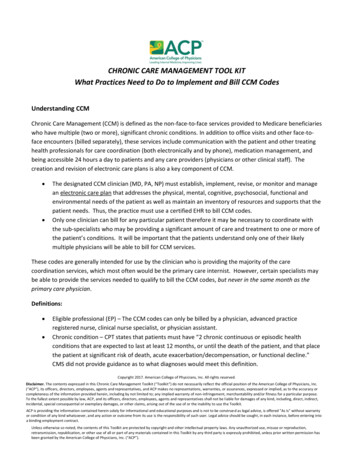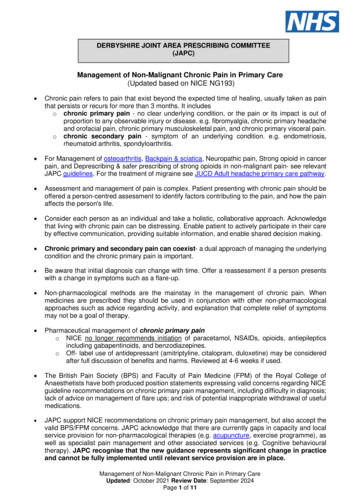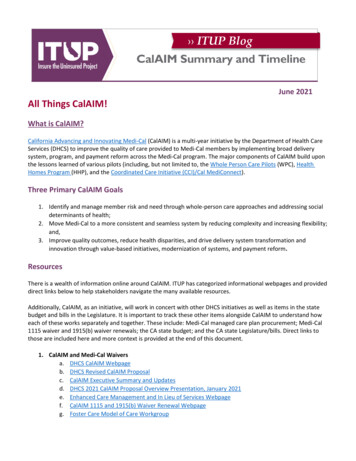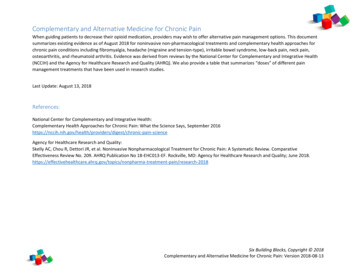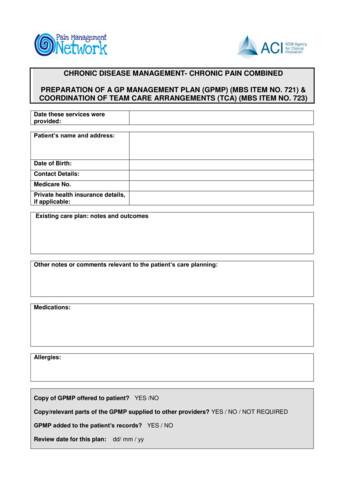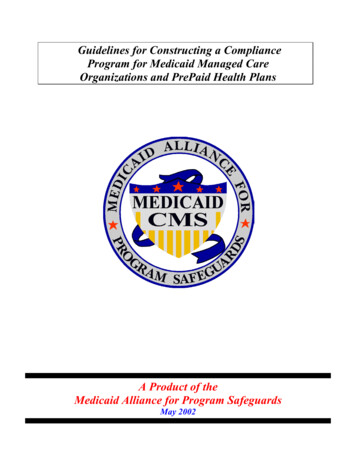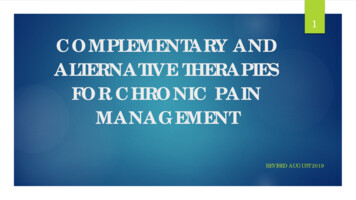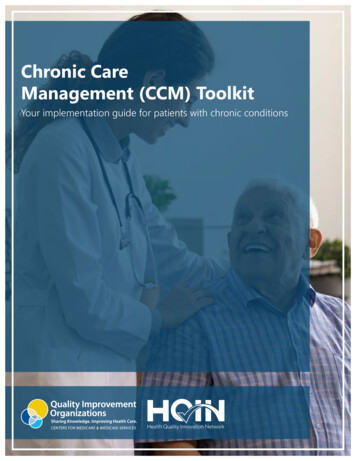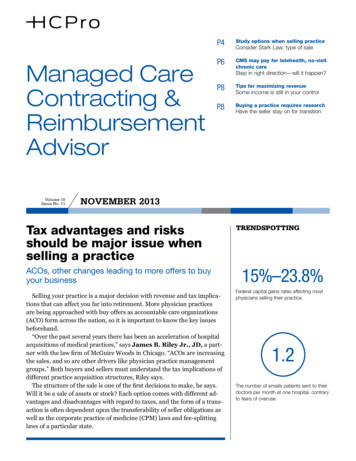
Transcription
Managed CareContracting &ReimbursementAdvisorVolume 10Issue No. 11P4Study options when selling practiceP6CMS may pay for telehealth, no-visitchronic careConsider Stark Law, type of saleStep in right direction—will it happen?P8Tips for maximizing revenueP8Buying a practice requires researchSome income is still in your controlHave the seller stay on for transitionnovember 2013Tax advantages and risksshould be major issue whenselling a practiceACOs, other changes leading to more offers to buyyour businessSelling your practice is a major decision with revenue and tax implications that can affect you far into retirement. More physician practicesare being approached with buy offers as accountable care organizations(ACO) form across the nation, so it is important to know the key issuesbeforehand.“Over the past several years there has been an acceleration of hospital acquisitions of medical practices,” says James B. Riley Jr., JD, a partner with the law firm of McGuire Woods in Chicago. “ACOs are increasingthe sales, and so are other drivers like physician practice managementgroups.” Both buyers and sellers must understand the tax implications ofdifferent practice acquisition structures, Riley says.The structure of the sale is one of the first decisions to make, he says.Will it be a sale of assets or stock? Each option comes with different advantages and disadvantages with regard to taxes, and the form of a transaction is often dependent upon the transferability of seller obligations aswell as the corporate practice of medicine (CPM) laws and fee-splittinglaws of a particular state.Trendspotting15%–23.8%Federal capital gains rates affecting mostphysicians selling their practice.1.2The number of emails patients sent to theirdoctors per month at one hospital, contraryto fears of overuse.
Managed Care Contracting & Reimbursement AdvisorThis document contains privileged, copyrighted information. If you have not purchased it or are not otherwiseentitled to it by agreement with HCPro, any use, disclosure, forwarding, copying, or other communication of thecontents is prohibited without permission.Senior Director, ProductErin CallahanEditor Greg Freemangafreeman@bellsouth.netNeil B. Caesar, Esq.The Health Law CenterNeil B. Caesar LawAssociates, PAGreenville, S.C.Robin J. Fisk, Esq.Fisk Law OfficeAshland, N.H.Gary Scott Davis, Esq.McDermott Will &Emery, LLPMiami, Fla.Paul R. DeMuro, Esq.Schwabe, Williamson& WyattPortland, Ore.John M. EdelstonHealthPro Associates, Inc.Westlake Village, Calif.Allan FineThe New York Eye and EarInfirmaryNew York, N.Y.Alice G. Gosfield, JDAlice G. Gosfield &Associates, PCPhiladelphia, Pa.Randi Kopf, RN, MS, JDKopf HealthLaw, LLCRockville, Md.Joan Roediger, Esq.Kalogredis, Sansweet,Dearden and Burke.Wayne, Pa.Reed Tinsley,CPA, CVA, CFPReed Tinsley & AssociatesHouston, TexasFollow and chat with us aboutall things healthcare compliance,management, and reimbursement.@HCPro IncManaged Care Contracting & Reimbursement Advisor (ISSN:1533-5453 [print]; 1553-9709 [online]) is published monthly by HCPro,Inc., 75 Sylvan St., Suite A-101, Danvers, MA 01923. Subscription rate: 249/year; back issues are available at 25 each. Managed CareContracting & Reimbursement Advisor, P.O. Box 3049, Peabody,MA 01961-3049 Copyright 2013 HCPro, Inc. All rights reserved.Printed in the USA. Except where specifically encouraged, no part ofthis publication may be reproduced, in any form or by any means,without prior written consent of HCPro, Inc., or the Copyright Clearance Center at 978-750-8400. Please notify us immediately if you havereceived an unauthorized copy. For editorial comments or questions,call 781-639-1872 or fax 781-639-7857. For renewal or subscriptioninformation, call customer service at 800-650-6787, fax 800-6398511, or email customerservice@hcpro.com. Visit our website at www.hcpro.com. Occasionally, we make our subscriber list available toselected companies/vendors. If you do not wish to be included on thismailing list, please write to the marketing department at the addressabove. Opinions expressed are not necessarily those of ManagedCare Contracting & Reimbursement Advisor. Mention of productsand services does not constitute endorsement. Advice given is general,and readers should consult professional counsel for specific legal, ethical, or clinical questions. Managed Care Contracting & Reimbursement Advisor is not affiliated in any way with The Joint Commission,which owns the JCAHO and Joint Commission trademarks.hcpro.comAn HHS survey released recently indicates that the percentage of doctorswilling to treat new Medicare patientshas stayed relatively stable over thepast two years.The 2012 data from the National Ambulatory Medical Care Survey revealed that90.7% of doctors admitted new Medicarepatients, compared to only 87.9% in2005.The report also noted that the rates ofnew Medicare patient acceptance aresimilar to those of physicians acceptingnew privately insured patients for thesame time period (2005–2012).“Overall, Medicare beneficiary accessto care has been consistently high overthe last decade and continues to behigh today,” the issue brief said. Thereare 650,000 physicians who participatein and bill Medicare, and including nonphysician providers like nurse practitioners, more than 1 million providers areactive in the Medicare program.Follow Us2Quick HitsDoctors still acceptingnew Medicare patients,HHS reportseditorial advisory boardNovember 2013Questions? Comments? Ideas?Contact Editor Greg Freeman atgafreeman@ bellsouth.net or 770-998-8455.from the field“ The tax implications of[selling a business] areextremely important andone that I don’t thinkphysicians initially focuson when they think aboutthis as an option for theirpractice.”James B. Riley Jr., JDstay connectedMCCRA in Your InboxSign up for any of our 17 emailnewsletters, covering a variety ofhealthcare compliance, management, and reimbursement topics,at www.hcmarketplace.com.Don’t miss your next issueIf it’s been more than sixmonths since you purchased orrenewed your subscription toManaged Care Contracting &Reimbursement Advisor, besure to check your envelope foryour renewal notice or call customer service at 800-650-6787.Renew your subscription early tolock in the current price.Relocating? Taking a new job?If you’re relocating or taking a newjob and would like to continuereceiving Managed Care Contracting & Reimbursement Advisor, you are eligible for a freetrial subscription. Contact customer serv ice with your moving information at 800-650-6787. At thetime of your call, please share withus the name of your replacement. 2013 HCPro, Inc. For permission to reproduce part or all of this newsletter for external distribution or use in educational packets, contact the Copyright Clearance Center at copyright.com or 978-750-8400.
November 2013Riley explains that the CPM doctrine generallyprohibits a business corporation from practicingmedicine or employing a physician to provide professional medical services. In some states corporate employers, such as hospitals, HMOs, and professionalcorporations, are exceptions to the CPM doctrine prohibition. Other states merely prohibit the practice of medicine without a license or the sharing offees between licensed and unlicensed individuals.Still other states flatly prohibit the ownership ofmedical practices or employment of professionals bynonprofessionals.The CPM issue must be addressed early in the consideration of a sale, in accordance with state law.Once that issue is settled, you can move on to the taximplications of an asset versus a stock sale, Riley says.“The tax implications of the transaction are extremely important and one that I don’t think physicians initially focus on when they think about this asan option for their practice,” he notes. “How muchyou can dictate some of the decisions and steer thedeal to your best tax advantage will depend on whois buying. If you are in a state that allows nonphysicians to own the practice, that gives physicians moreflexibility to decide whether to structure the sale as anassets sale or a stock sale.”An asset sale is one in which a buyer purchasescertain assets and liabilities of a physician practicebut not others. A stock sale, on the other hand, iswhat most people think of when they imagine someone “buying a practice”—the buyer is acquiring thepractice with the intention of replacing the seller asthe doctor within the practice. The stock sale involves a buyer purchasing a seller owner’s equity ina physician practice as well as its assets and liabilities. Additionally, most or all of the accounts on thephysician practice’s balance sheet are sold with thepractice.The incorporation of the practice—namely,whether it is a C corporation or an S corporation—becomes important during a sale, Riley says. With aC corporation, income is taxed once as earnings, andthen shareholders are taxed again when corporateearnings are distributed. In contrast, S corporation earnings are generally taxed just once, with theshareholders. When evaluating an offer to purchaseManaged Care Contracting & Reimbursement Advisoryour practice, consider how the incorporation willaffect the proposed price. The net purchase priceafter taxes can be substantially less for C-corporationshareholders than for S-corporation shareholders,Riley says. (See the story on p. 4 for more on the different sale options.)Asset valuation is another important area to consider. A buyer will record a practice’s assets and liabilities at their fair market value, which could alter theircarrying value and/or amount of annual depreciation,Riley explains. The selling physician practice willrecognize a taxable gain or loss based on the difference between the allocated sale price and the tax basisof the assets and liabilities. C corporations usually endup with an increased tax burden, Riley says.“If you are in a state that allowsnonphysicians to own the practice, thatgives physicians more flexibility todecide whether to structure the sale asan assets sale or a stock sale.”—James B. Riley Jr., JDHow much can the tax hit be? It can be pretty big.Federal long-term capital gains rates are between15% and 23.8%, and federal ordinary income tax ratesgo as high as 39.6%. If the practice being sold is an Scorporation but formerly was a C corporation withinthe 10-year built-in gain tax recognition period, additional taxes could be owed, Riley notes.With a stock sale, the practice’s assets and liabilities stay with the business. Sellers often favor thisoption because they want to simply sell the whole kitand caboodle and be done with it, Riley explains. It istypical, however, for purchase agreements to includeindemnification clauses that make the seller responsible for some liability during the transition period,he adds.Capital gains also can become an issue with a stocksale because the seller may have a gain or loss basedon the difference between the price paid and the current basis in the stock, Riley explains. This lossor gain usually is treated as a capital gain, making itsubject to lower federal capital gains rates—currently15%–23.8% for most sellers. 2013 HCPro, Inc. For permission to reproduce part or all of this newsletter for external distribution or use in educational packets, contact the Copyright Clearance Center at copyright.com or 978-750-8400.hcpro.com3
Managed Care Contracting & Reimbursement AdvisorSmaller physician practices, such as practices withonly two or three physicians who are all retiring atonce, may not have much leverage when it comes tostructuring the sale, Riley notes. If a physician in sucha practice wants to retire within a certain time frame,the buyer may have all the power to dictate terms.Being flexible and willing to postpone retirement cangive the seller more power, he says.The worst outcome from selling a practice would bea sale of assets by a C corporation without consideringthe tax implications, Riley says. The double taxationcould be a ruinous surprise after the deal is done.“We’ve seen practices in that situation. They didn’tplan in advance for the potential sale of their practice, or there may have been certain components ofthe practice that were sold,” Riley says. “If they hada cath lab in the practice under a C corp and soldthat lab to a hospital, they could be subject to doubletaxation.”But as important as tax considerations are, theyshould not be the biggest driving force when negotiating a sale, says Neil S. Maxwell, JD, a partner withthe law firm of Kurzman Eisenberg Corbin & Leverin White Plains, N.Y. The sale of a practice requiresextensive planning and research, so you should planto devote a full year to this preparation before signinga contract, he says. In addition to research and contract negotiations, you should spend that year gettingthe practice in the best shape possible so that you geta top-dollar offer.“If you see that hospitals are buying out the physician practices in your area, don’t wait until someonecomes to you with an offer,” Maxwell says. “Get started now with your assessment. Do your own valuation.November 2013Know your strengths and what kind of deal you wantbefore they come to you and express an interest.”Besides, while an actual purchase of the practicemight be what a hospital is looking for, it might not bethe best choice for the physicians, he says.“Hospitals are paying very, very little for assets andinstead they are looking to employ the doctors,” heexplains. “The employment contract might take intoaccount the value of the practice and assets, but thehospital doesn’t want your old computers and desks.They don’t need them.”An office lease also can become an issue. Thehospital may want the physicians to move into thehospital’s property, leaving the practice to make itsown deal to get rid of its current office space. In somecases, the hospital will sublease the space or buy someof the practice’s equipment as part of the employmentdeal. It is unlikely that the hospital really wants the office space or equipment; this kind of offer is probablyjust made to sweeten the deal, Maxwell says.“Always work with an accountant on any deal likethis, not just an attorney,” he says. “Generally if onecomponent of the deal is good for you, it’s not goodfor the other side. This all becomes a negotiation andthere is a lot of money at stake.”Overall, the sale process can be challenging; evenfinancially savvy physicians and their advisors canmake mistakes, Maxwell notes. That’s why he advisesalways including an “unwind” provision in the salecontract. “Let’s make sure that if it doesn’t work out ina year or two, we can get back to where we were,” hesays. “Not everyone is going to agree to it, but if theyargue that, you can tell them to give you a five-yearguarantee instead. It’s a negotiation.” HConsider Stark Law, options when selling practiceThe sale of a physician practice must always beviewed in light of the regulatory requirements andprohibitions of the federal anti-kickback statute andStark Law, including the need to confirm that thepurchase price is consistent with fair market value, explains Ed Brown, JD, partner at the law firm ofBurr & Forman in Atlanta.4hcpro.comIf the purchaser is a tax-exempt facility, IRSregulations must also be considered, including rules regarding private inurement and excess benefits. Astax rates increase, the tax sensitivity to these types of transactions will likewise increase, Brown says.There are numerous tax issues that can arise inconnection with the sale of a practice, both from 2013 HCPro, Inc. For permission to reproduce part or all of this newsletter for external distribution or use in educational packets, contact the Copyright Clearance Center at copyright.com or 978-750-8400.
November 2013the perspective of the buyer as well as the seller. Because of the differences between C corporationsand S corporations, and the two types of sale options (stock and asset), planning for the transitionof the practice well in advance of the actual event iscrucial.Each type of sale has its advantages and disadvantages for both the buyer and the seller. Brown offersthis summary of the two options.Sale of stockAdvantages If the practice is structured as a C corporation, thesale of stock will create a capital gain for its physicians. Unlike a sale of assets, a stock sale willcreate two levels of tax: a tax to the practice with respect to the sale of the assets themselves, and asecond tax to the physicians upon distribution ofthe cash to the shareholders. If the practice is structured as an S corporation, thetax benefit compared to the sale of assets is generally less, but a sale of stock is still less expensiveand possibly tax prudent. For the physicians, the sale of stock transfers all assets and liabilities—and thus all ongoing obligations—to the buyer. For both parties, a stock sale is generally less expensive and easier to consummate, as it avoidsthe need to transfer title to assets as well as obtaining some of the consents that would be required in connection with an asset sale.Disadvantages The buyer in a stock sale is likely to be at a taxdisadvantage for several reasons. First, to the extent that the assets owned by the practice havealready depreciated, the buyer steps into theshoes of the practice and will only be entitled toany remaining depreciation. Second, the purchase of the stock does not create any “goodwill”that would otherwise be amortizable in an assettransaction. The physicians will likely have greater risk to thebuyer with respect to breaches of representationsand warranties and liabilities connected to outstanding claims. Although they might retain theseManaged Care Contracting & Reimbursement Advisor same risks in an asset sale, they would alsoretain the right to manage the risks and anyclaims, whereas they might give up that controlin a stock sale.The buyer may not want to take the risk of assuming known, as well as unknown, liabilities that maycome with the purchase of the shares.Asset saleAdvantages An asset sale provides greater flexibility. Certain liabilities and assets can be purchased, while others can be left behind with what remains of thepractice. The buyer is able to have a new tax basis in theassets acquired based upon their fair market value at the time of the purchase, and the buyer willthen be able to realize a tax benefit from the assets’ depreciation over time. In addition, the excess purchase price over the fair market value ofthe tangible assets can be treated as “goodwill”and be amortizable by the buyer, although manyvaluation firms will not value goodwill in a medical practice due to regulatory compliance rules.Disadvantages The physicians will generally have a greater taxburden in an asset sale, although this mightnot be so in the case of the sale of stock in an S corporation. With a C corporation, however, thephysician seller can count on double taxation onthe sale of the assets. The owners need to remember that in negotiating a sale, the buyer would likely obtain tax benefits from purchasing the assets asopposed to the stock and thus might also be willingto pay more for the assets. This might help to narrow the tax difference between a stock and an asset sale. An asset sale is often more cumbersome for both parties. The need to obtain consents and documentthe transfer of specific assets can be more expensive and time-consuming than simply acquiringthe stock. There is a general rule in the sale of businessesthat “buyers want to buy assets and sellers want tosell stock.” This rule applies to medical practices 2013 HCPro, Inc. For permission to reproduce part or all of this newsletter for external distribution or use in educational packets, contact the Copyright Clearance Center at copyright.com or 978-750-8400.hcpro.com5
Managed Care Contracting & Reimbursement Advisoras well as other businesses. Nevertheless, there area v ariety of factors that may push the parties to aparticular sale type:–– While most sales are asset sales, a stock purchaseis sometimes used even though the buyer picksup additional potential liabilities. It is important, however, to pay attention to prohibitions onthe corporate practice of medicine as well as feesplitting arrangements.–– Asset sales are more common, particularlyNovember 2013when a practice is being closed and the physicians are not planning on continuing to practice but wish to retain the accounts receivable.In these instances, however, the practice needsto be careful not only to avoid violations of thecorporate practice of medicine and fee splittingrules, but also to obtain fair market appraisalsfor the assets being sold in order to protectagainst any claim that the purchase price includes referrals. HCMS might pay for telehealth, chronic care without visitIt might be a move in the right direction, or itcould be a significant change in how the physicianfee schedule encourages certain types of care—wewon’t know until later—but right now it’s encouraging that CMS is considering paying primary carephysicians for chronic care management serviceswithout an in- person visit, and also for telehealthservices.If CMS follows through with the proposal in theMedicare Physician Fee Schedule for 2014, thechange would start in 2015. Physician groups havelong advocated for chronic care payments, but under the CMS proposal patients would need tohave an annual, in-person wellness visit and consent to a doctor’s management plan for a year. Forthe telehealth payment, the proposal redefines theCPT codes for telehealthHere are the CPT codes for telephonic and email care.Note the nonphysician provider codes that are listed. Justlike telephone calls, trained support staff can screen emailsand escalate issues that require a primary care physician.6Telephonic careEmail carePhysicians99441, 2, 399444 Nonphysician providers98966, 7, 898969hcpro.com efinition of “rural” to avoid disruption of servicesdif an area’s geographic designation is changed.CMS said in the proposal that it is looking for evidence that “the service furnished by telehealth toa Medicare beneficiary improves the diagnosis ortreatment of an illness or injury” or that it improvespatient functioning.“If you look at some of these hurdlesyou have to climb, telehealth is stillsomething we’re not going to see reimbursed often.”—Rene Y. Quashie, JDEven with these changes opening up coverage tomore patients, the telehealth benefit under Medicareis still very restrictive, says Rene Y. Quashie, JD,senior counsel with the law firm of Epstein BeckerGreen in Washington, D.C.“If you look at some of these hurdles you have toclimb, telehealth is still something we’re not goingto see reimbursed often,” Quashie says. “It won’thappen unless your patient presents in the most ruralcounties in the United States. The next hurdle is thatyou have to present at one of eight types of facilities,including a physician’s office.” Similarly, telehealthcan only be provided by one of eight kinds of healthcare p rofessionals, and in addition, only certain kindsof codes are eligible, mostly involving screening and 2013 HCPro, Inc. For permission to reproduce part or all of this newsletter for external distribution or use in educational packets, contact the Copyright Clearance Center at copyright.com or 978-750-8400.
November 2013mental healthcare.“This is an opening and it’s important,” Quashiesays. “It will increase the number of people whomight benefit from telehealth, but doctors still havea long way to go see how it works out, whetherthey are fairly compensated for the time spent ontelehealth.”Improved reimbursement for telehealth is longoverdue, says Tom Doerr, MD, a physician in Boston who specializes in geriatrics and regularly communicates with patients by email.“By and large it’s not been embraced, and this is aterrific opportunity to expand our work in light of theManaged Care Contracting & Reimbursement Advisorshortage of physicians,” Doerr says. “We can increaseour capacity and still do it well.”He notes that Group Health Cooperative in Seattleused emails for six years and found that 30% of outpatient encounters are now done by email. (For moredetails on telehealth usage, see the story on p. 7.)“I think primary care physicians are going to see atsunami of patients wanting care and newly insured in2014, and this is one of the easier ways to expandcapacity,” Doerr says. “You don’t have to take on thehiring of a new midlevel clinician. There is a lot lessstress involved with just sending an email and gettingreimbursed for it.” HEmail telehealth popular among patients, data showResearch demonstrates that telehealth is popular among In 2013, Patrick Courneya and colleagues at Minnesota’sboth patients and clinicians, says Tom Doerr, MD, a physician HealthPartners found that online visits for simplein Boston who specializes in geriatrics and regularly communi- conditions delivered savings of 88 per visit, and 98% ofcates with patients by email.the patients would recommend the service to a friend.6He notes these findings: A 2002 Harris survey found that many patients wantedReferencesemail care; moreover, they would pay for it, and it would1. Institute of Medicine of the National Academy of Scienceinfluence their choice of doctors and health plans.1(2001). Crossing the Quality Chasm: A New Health SystemIn 2005 Charles Kilo, MD, demonstrated that 80% of carefor the 21st Century. p. 127.in the five-doctor Greenfield Clinic in Portland, Ore., couldbe delivered through the Web—most of it via email.2 In asubsequent interview, he stated, “Doctors hate to admitthis but a very large percentage of what we do does ry Care: From Past Practice to the Practice of the Future.”Health Affairs 2010;29:779–784.3. Harris Interactive Health Care Research (2002). “Patient/not have to happen in the office. Fifty percent of office vis-Physician Online Communication: Many patients wantits don’t need to occur.”3it, would pay for it, and it would influence their choice ofAt Harvard-Beth Israel Deaconess Medical Center, Johndoctors and health plans.” Full text free online at www.Halamka found that the average patient sent 1.2 hnews/HIto his or her provider every month. Ninety percent ofthese emails could be triaged to extenders such as 2. Margolius D, Bodenheimer T (2010). “Transforming Prima-HealthCareNews2002Vol2 Iss08.pdf.4. Kilo CM (2005). “Transforming Care: Medical Practice De-nurse practitioners.4sign and Information Technology.” Health Affairs 2005;24:Kaiser implemented email care and found that between1296–1301. http://content.healthaffairs.org/cgi/content/2004 and 2007, the total office visit rate decreased26.2%; meanwhile, secure email messaging, which beganabstract/24/5/1296.5. Carroll J (2006). “Everyone Uses E-mail Now (Except Doc-in late 2005, increased nearly sixfold by 2007.5 Kaiser alsotors and Patients): Here’s how the process works today,found statistically significant improvements in numerouswho pays for it, and when and why it makes sense.” Man-Healthcare Effectiveness Data and Information Set met-aged Care August 2006. www.managedcaremag.com/ar-rics among patients who were email users, compared tochives/0608/0608.email.html.non-users.6. Ibid. 2013 HCPro, Inc. For permission to reproduce part or all of this newsletter for external distribution or use in educational packets, contact the Copyright Clearance Center at copyright.com or 978-750-8400.hcpro.com7
Managed Care Contracting & Reimbursement AdvisorNovember 2013Maximize revenue with attention to detailEven with all the changes in healthcare that seem tobe out of your control and squeeze your revenuestream tighter every day, there still are ways to improve your bottom line, says Dixon Davis, vicepresident of AAPC in Salt Lake City, which providestraining and c redentialing in medical coding.“There is still a lot of money being wasted throughclaim denials and information not being sent topayers right the first time,” Davis says. “You have to maintain productivity, and that comes down to howmany patients you’re seeing and working as effectivelyas you can. And then you have to capture the data andrelay that accurately for payment. That’s still underyour control.”Physician offices can get so busy that charges arenot captured, Davis says. There must be a solid process for capturing all the data generated by clinicalcare, and then that information must be submittedaccurately for payment the first time.Davis suggests using an audit sheet, which can beposted at the front desk or the intake area, to remindstaff of the data they must collect on each patient.In addition, codes should be double-checked before sending a claim to the insurer.“These key steps can be overlooked because we’reso busy. We’re trying to run such a lean physicianpractice and that can have consequences,” Davis says.“Formal checklists and audit sheets can help youavoid the mistakes, even when you hire a new frontdesk person who has no experience with this datacollection.”A practice also should have a process in place tocollect patients’ copays up front before they see the doctor. Any decision about delaying payment or waiving the copay should be made at this stage, not whenthe patient is with the doctor, Davis says.“Studies have shown that it costs about 20 or 25 for you to collect the payment at some laterdate, and that may be all the copay is,” he says.“If you collect it up front, that’s money in yourpocket instead of having to spend money to collectmoney.” HBuying a practice just as challenging as sellingThe trend may be for hospitals and other entities tobuy physician practices, but physician groups are alsomaking such acquisitions, notes Bradford Hall, JD,CPA, managing director at Hall & Company CPAs inIrvine, Calif.Of additional note, Hall is seeing far more asset purchases than stock purchases among
call 781-639-1872 or fax 781-639-7857. For renewal or subscription information, call customer service at 800-650-6787, fax 800-639-8511, or email customerservice@hcpro.com. Visit our website at www. hcpro.com. Occasionally, we make our subscriber list available to selected companies/vendors. If you do not wish to be included on this
